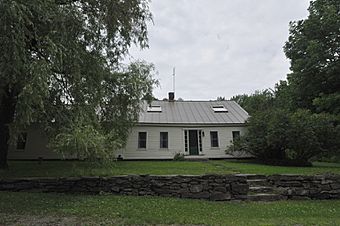Aiken Stand Complex facts for kids
Quick facts for kids |
|
|
Aiken Stand Complex
|
|
 |
|
| Location | Royalton Tpk. at Sayer Rd., Barnard, Vermont |
|---|---|
| Area | 3 acres (1.2 ha) |
| Built | 1805 |
| Architectural style | Federal, Cape/Classic Cottage |
| NRHP reference No. | 83003229 |
| Added to NRHP | January 27, 1983 |
The Aiken Stand Complex is a pair of historic buildings in the countryside of Barnard, Vermont. These buildings were constructed a long time ago, around 1805 and 1835. They were once the center of a busy little village. This village was important when the Royalton Turnpike was the main road for travel in the early 1800s. Today, the buildings are listed on the National Register of Historic Places. This means they are recognized as very special and important to history.
Contents
Discovering the Aiken Stand Complex
The Aiken Stand Complex is located in a quiet, rural part of eastern Barnard. At the corner of Royalton Turnpike and Sayer Road, you will find the main building. It is a two-and-a-half-story wooden house. It has a sloped roof and a large chimney in the middle. The outside is covered with wooden boards.
What Do the Buildings Look Like?
The main building has five windows on the front. Its style is mostly Federal, which was popular in the early 1800s. Across the road to the west is another building. This one is a one-and-a-half-story house. It is built in the Cape style.
This second building also has a similar outside look. However, it shows Greek Revival features. For example, it has tall, narrow windows next to the front door.
A Busy Stop on the Turnpike
This location was a popular stop for travelers for many years. Records show that Solomon Aiken was running a tavern here as early as 1781. His business grew even more when the Woodstock and Royalton Turnpike was built in 1800. A turnpike was a special road where people paid a fee, or "toll," to use it.
Around 1805, Solomon Aiken built the main tavern building. He needed more space for all the new customers. The smaller Cape-style house was added in 1835. It helped with extra visitors and gave more room for the Aiken family.
Famous Visitors and Village Life
Many important people stopped at the Aiken Stand tavern. One famous visitor was President James Madison in 1817. Another was the Marquis de Lafayette in 1824. He was a French hero who helped America during the Revolutionary War.
At its busiest, the tavern was the heart of a small village. There was also a blacksmith's shop nearby. A school was part of the community too.
The End of an Era
The Royalton Turnpike became less important over time. This happened after railroads were built in Vermont. Trains became the main way to travel and move goods. The tavern business closed down in the 1870s.
The buildings were then used as private homes. They were lived in until the mid-1900s. After that, they were left empty for a while. In the early 1980s, the buildings were carefully restored. This helped bring them back to their original look and importance.



